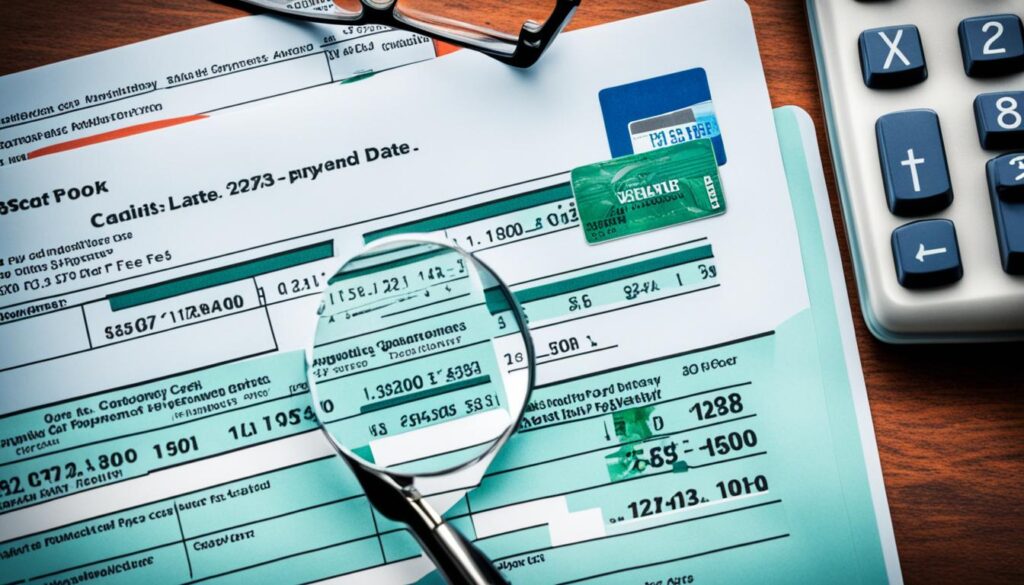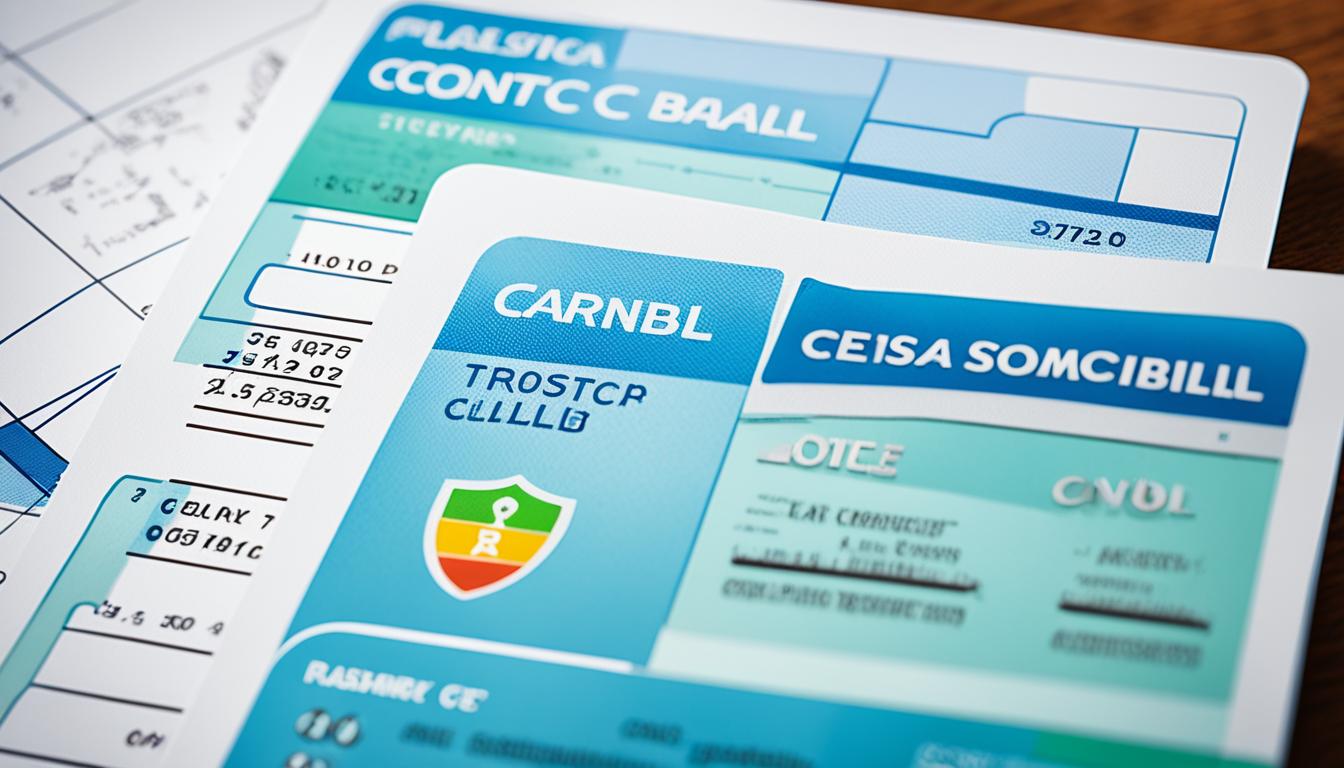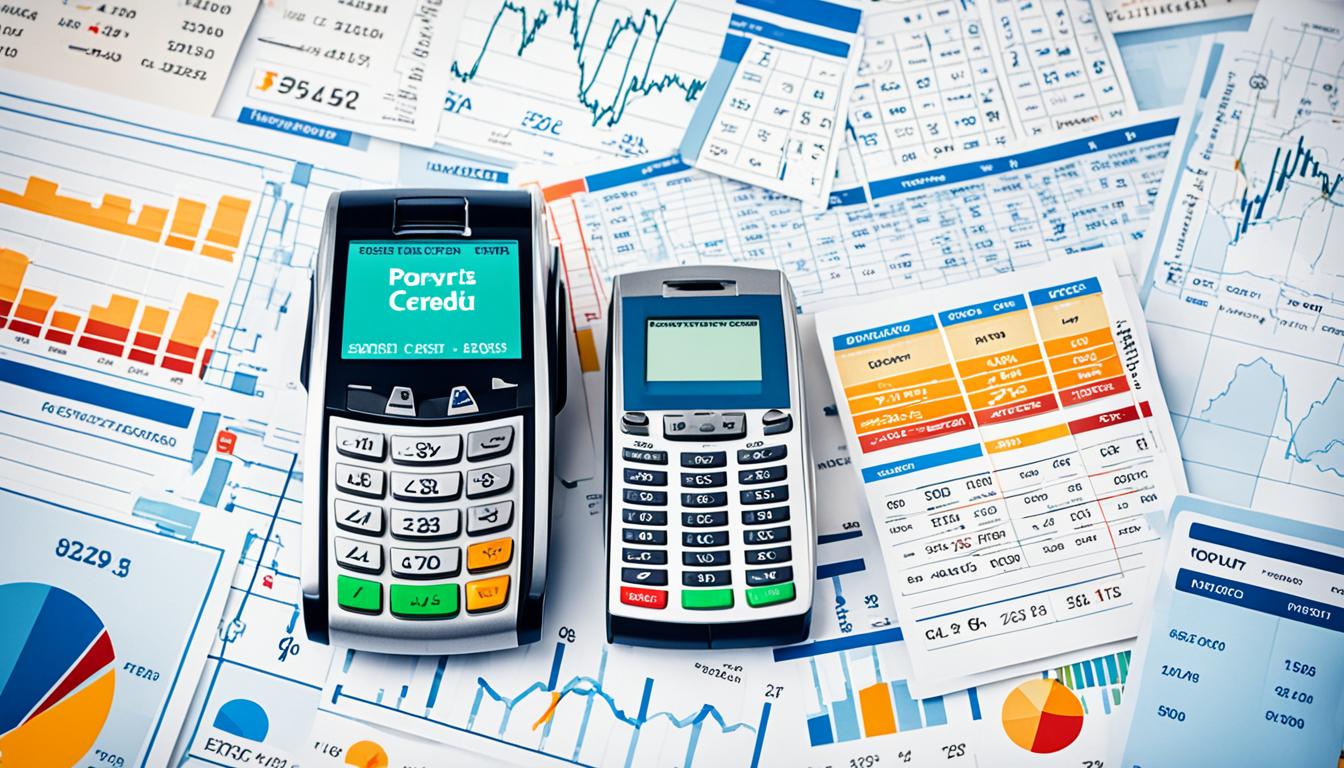In 2020, did you realize that credit card debt in the United States surpassed $930 billion? Credit cards play a crucial role in our finances and can be helpful for establishing credit and receiving rewards. However, it is important to use them responsibly to avoid debt accumulation. Below are some useful tips on how to effectively use credit cards. Let’s get started!
Key Takeaways:
- Pay off your credit card balance in full each month to avoid interest charges.
- Choose a credit card that fits your spending and needs.
- Make payments on time and spend only what you can afford for good credit.
- Keep your credit use under 30% to keep your credit score up.
- Learn about credit scores and how to make yours better.
Choosing the Right Credit Card for You
Finding the right credit card is key. It must match your spending style and money goals. Think about what rewards you’d like, such as cash back or travel points.
Look at different credit cards to see what suits you. Always read the fine print to avoid unexpected fees. This helps you stay informed.
“Choose a credit card that offers benefits and rewards that are relevant to your lifestyle and goals.”
Think about various factors when picking a card. Fees, APRs, and bonuses all matter. Some cards have fees but offer great rewards.
Consider how much credit you can handle without overspending. Don’t get tempted by a high credit limit.
Using the right credit card smartly can really help you financially. Take your time to find the best one for you. It should give you good rewards and fit your spending.
Comparing Credit Cards
Here’s a table comparing some popular credit cards to help you:
| Credit Card | Annual Fee | APR | Rewards | Benefits |
|---|---|---|---|---|
| Chase Sapphire Preferred | $95 | Variable* | Travel Points | Travel Insurance, Transfer Partners |
| Citi Double Cash | $0 | Variable* | Cash Back | No Annual Fee, 2% Cash Back |
| Discover it Cash Back | $0 | Variable* | Cash Back | No Annual Fee, Rotating 5% Categories |
View this table as a guide. Make sure to research every credit card well. Pick one that best meets your needs.
Paying Bills on Time
It’s super important to pay your credit card bills on time. Your payment history majorly affects your credit score. This is what lenders look at. If you pay late, you could face more debt, lower scores, and big interest charges.
You can avoid missing payments by setting up autopay or phone reminders. Knowing your card’s minimum payment and grace period is key. This way, you dodge late fees and interest charges.
| Payment History | Credit Score Impact | Late Fees | Interest Charges |
|---|---|---|---|
| Consistently on time | Positive impact, higher credit score | Avoided | Avoided |
| Late payments | Negative impact, lower credit score | Incurred | Increased |
Paying on time shows you’re responsible with money. This keeps your credit in good shape. It saves you from fees and charges. Plus, it makes getting future credit easier.

Image: Visual representation of how late fees can accumulate over time.
Spending Within Your Means
Using a credit card means you should be careful. It is not free money. Spend only what you can afford to pay back in full.
Maxing out your cards is bad for your credit. Your credit utilization rate (CUR) can go up. CUR is your used credit divided by total credit available.
Keep your CUR below 30% to have a good credit score. For a $10,000 limit, don’t go over $3,000. Keeping your CUR low shows you’re good with money.
Know how much you can spend by checking your budget. It’s important to think about how much things cost. Make sure what you buy fits your money goals.
Spend within your means to avoid too much debt and interest charges. Interest charges can grow fast. This makes it hard to clear your card balance.
Using credit cards right, keeping your CUR low, and skipping what you don’t need helps you. You’ll stay financially healthy and keep a good credit score.
Example Scenario:
Imagine you have a card with a $5,000 limit. Try to keep your balance under $1,500. This is less than 30% of your limit. It helps you use a smart amount of your credit.
| Credit Limit | Maximum CUR |
|---|---|
| $5,000 | $1,500 |
Following these tips keeps your credit use in check. It’s key for being seen as creditworthy and financially stable.

Understanding Credit Scores
Knowing about credit scores is key to handling your money. They help get loans and good interest rates. Lenders check scores to see if you’re a good borrower.
Your payment history greatly affects your score. It shows if you pay bills on time. Lenders like it when you always pay on time.
Credit utilization is how much of your limit you use. It’s best to use less than 30%. This shows you’re good with credit.
Having a long credit history helps your score. Lenders can learn more about how you use money. Also, having various types of credit, like cards and loans, is good.
Applying for many credit cards quickly can look bad. It might seem like you want to borrow too much money.
Credit scores are usually from 300 to 850. High scores mean you’re less risky and get better loan rates.
It’s crucial to have a high credit score for your future. It opens up better loan options and rates. By knowing what affects your score and being careful with money, you’re set for success.

| Factors Affecting Credit Scores | Impact on Credit Score |
|---|---|
| Payment History | Significant impact, positive with timely payments |
| Credit Utilization | Medium impact, lower utilization is favorable |
| Length of Credit History | Medium impact, longer history is preferred |
| Credit Mix | Medium impact, diverse mix is beneficial |
| Recent Credit Card Applications | Low impact, multiple applications may raise concerns |
Building Credit from Scratch
If you’re starting with no credit history, you can take steps to build your score. Building Credit Score is key for your financial reputation. It opens doors to future opportunities. Follow this guide to start off right.
1. Establish a Positive Payment History
Your Payment History greatly affects your credit score. Pay all your bills on time, including credit card bills. Use reminders or automatic payments so you don’t miss a due date.
2. Keep Credit Utilization Low
Your Credit Utilization is another important part of your score. Use just a small bit of your available credit. This shows you’re careful with borrowing. Try to keep your utilization under 30% for a good score.
3. Maintain a Diverse Credit Mix
Having various credit accounts is also good. It improves your Length of Credit History. Mix in credit cards, student loans, auto loans, or mortgages. This shows you can handle different credit types well.
4. Keep Your Oldest Account Open
The Length of Credit History is vital for your score. So, keep your oldest credit account open. This account proves you can manage credit over time. It helps show you’re creditworthy.
5. Monitor and Correct Your Credit Report
Always check your credit report for accuracy. Look for errors that could lower your score. If you find mistakes, dispute them with the credit agencies to get them fixed.
By following these steps to build your credit score, you’ll improve your financial health. Remember, building credit needs patience and discipline. But, it’s worth it in the end!

Common Credit Card Mistakes to Avoid
Using credit cards has some common mistakes that can hurt your finances. Knowing these mistakes and how to avoid them lets you use credit cards well. This way, you can enjoy their benefits without the risks.
- Carrying balances and incurring high interest rates: A big mistake is not paying off your card each month. This causes high interest charges to add up. To avoid this, always pay your balance in full by the due date. This way, you won’t pay extra in interest.
- Paying unnecessary fees: Credit cards often have fees like annual fees and late payment fees. These fees can take away from your money. Before getting a card, look at the fees. Choose cards with low fees that fit how you spend your money.
- Overspending: With a high credit limit, it’s easy to spend too much. But overspending can lead to debt. To stop this, have a budget and follow it. Remember, your credit card isn’t free money. Only spend what you can pay off each month.
- Not monitoring your credit card activity: Not watching your card activity can risk fraud. Always check your card statements and online account. This makes sure all charges are correct. If something looks wrong, tell your card issuer right away. Watching your card keeps your money safe.
To use credit cards wisely, pay your balance in full, avoid fees, and stick to a budget. Avoiding these common mistakes helps you build strong finances. This way, you can make smart choices with your credit card.

Protecting Your Credit Card Information
Keeping your credit card safe is very important. This includes watching for fraud, checking your card activity, and telling your bank about any charges you didn’t make. Doing these things will help keep your card secure. It helps you keep your money safe.
Be Cautious When Sharing Card Details Online
Be careful where you enter your card details online. Only use trusted sites with safe payment methods. These sites show a padlock icon, meaning they’re secure.
Watch out for scams trying to trick you into giving away your card information. Don’t click on weird links in emails or pop-ups. They might be fake websites trying to get your info.

Regularly Monitor Your Credit Card Activity
It’s key to watch your card’s activity. This helps you spot any wrong charges. Go over your monthly bill and transactions often.
Card companies have tools and apps to make this easy. Set up alerts to know about any card use right away.
Report Unauthorized Charges Promptly
If you find charges you didn’t make, tell your card company fast. Call their customer service to start fixing the problem. They usually won’t make you pay for these wrong charges.
Give them all the details they need to help you. They will walk you through how to dispute the charges.
Fraud Protection Services and Identity Theft Assistance
Card companies often offer help to watch for fraud. They look for any strange activity on your account. Some also help you if your personal info is stolen.
Using these services helps keep your card safe. They can quickly help if there’s fraud or identity theft.
| Tips for Protecting Your Credit Card Information |
|---|
| Be cautious when sharing your card details online |
| Monitor your credit card activity regularly |
| Report unauthorized charges promptly |
| Take advantage of fraud protection services and identity theft assistance |
Follow these tips and take steps to protect your card. This reduces the risk of fraud. Stay sharp, be informed, and care for your money’s security.
Conclusion
Using credit cards wisely comes with many perks, like better credit, cool rewards, and more financial freedom. Just stick to the tips shared here, like always paying bills on time, watching your spending, knowing your credit scores, and dodging typical mistakes. These steps will help you get the most from your credit cards and boost your money situation.
It’s key to spend smart and keep a close eye on your credit card use. Doing this keeps your credit score healthy. Smart credit card habits can give you a good credit history. This, in turn, can help you get better loans and interest rates later on.
Being careful with how you spend can help you stay out of bad debt. It also helps improve how well you handle your money. With the right plan and smart use, credit cards can be a big help in reaching your money goals. They can help you build a better future.
FAQ
How can I maximize the benefits of using a credit card?
What should I consider when choosing a credit card?
How important is it to pay bills on time?
How can I ensure I’m spending within my means with a credit card?
How do credit scores work and what factors affect them?
How can I build my credit from scratch?
What are common credit card mistakes to avoid?
How can I protect my credit card information?
What should I remember when using a credit card?
What Advice Can Help Me Use My Credit Card Wisely?
To use your credit card wisely, treat it like cash. Spend within your means to avoid high-interest debt. Always pay the full balance to prevent fees. Keep credit card information here secure to protect your finances. Review statements for irregularities and understand terms for rewards and benefits.









